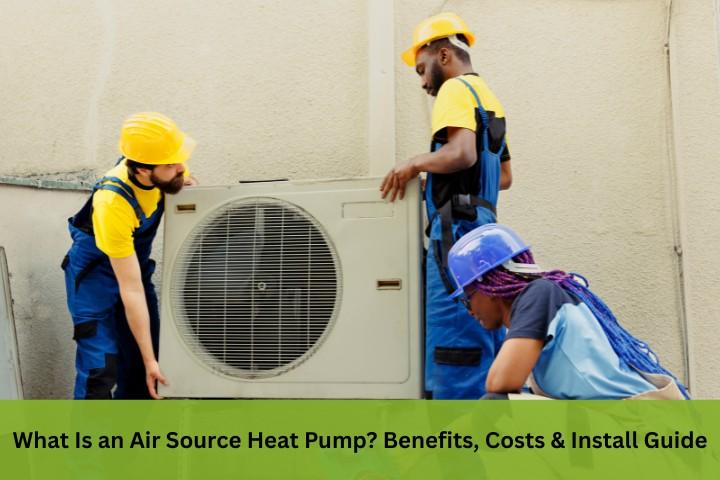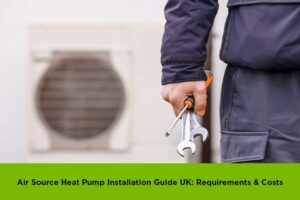Soaring heating bills have been the largest problem for UK households right now. Even affluent households find it difficult to afford those whopping energy bills. But apparently, the UK has discovered a good remedy for that issue in the form of installing heat pumps.
You’ve likely heard rumors about air source heat pumps over dinner or seen your neighbor’s secretive new outside unit. But what’s the big deal? Are they as great as everyone makes them out to be? Let’s get the inside scoop and discover why your friends just won’t shut up about their heat pump.
What Is an Air Source Heat Pump?
This may sound difficult to believe, but there is still floating heat in the air even in -15°C. That’s the air an air source heat pump capitalizes on. Heat pumps operate exactly like a refrigerator, except in reverse functionality. Rather than it giving cooling, it tosses heat within the house, together with the hot water.
But here’s the exciting part, and this is where your jaw will actually fall. For each unit of electricity that your heat pump consumes, it will emit up to 4 units of heat. That’s like having four coffees for the cost of one. Can your old boiler do that? I didn’t think so.
How Does an Air Source Heat Pump Actually Work?
The outdoor unit fan of your heat pump pulls the heat out of outside air to make your room warm using the radiators. Although you find it difficult to walk barefoot in your room, your heat pump is capable of producing the amount of heat needed by your heating system and domestic hot water.
During this process, air is passed through coils containing refrigerant, which is capable of drawing out all the heat from the outside air. Then, your heat pump compresses the refrigerant, which also warms the air and supplies heating and hot water to the whole house.
Types of Heat Pumps In The UK
Not quite sure which heat pump is beckoning to you? Fear not, picking the best one doesn’t need to be rocket science. Let’s analyze your choices:
Air-to-Water Heat Pumps
Do you have a preferred style of sticking with what is tried and tested? These lovely things suck up heat from the outside air and pipe it directly into your current wet heating system. Radiators? Great. Upmarket underfloor heating? Even greater. They’re the likeable friend that will be friends with everyone.
Air-to-Air Heat Pumps
Like cutting out the middleman? These systems deliver hot or cold air directly into your spaces, no water, no hassle. Imagine them as high-efficiency air conditioners but in reverse. The downside? They won’t warm your hot water, so you’ll have to figure something else out for those wonderful warm showers.
Hybrid Heat Pumps
Torn between the old and the new? You’ve got your cake and it too with a hybrid heat pump. Your heat pump carries the can most of the time, but when Jack Frost bites hard, your faithful boiler chimes in to assist. Best of both worlds, don’t you agree?
Why Everyone's Going Crazy for Air Source Heat Pumps
So why the fuss? Why are your neighbors almost evangelizing about their heat pumps? Let me spill the tea:
Your Bank Account Will Thank You.
Sick of heating bills that leave you wondering if you’ve made a grave mistake in life? A heat pump could be the budgetary salvation you’ve been praying for. Particularly if you’re burning through oil, LPG, or electric heating at the moment, your bank account could be totally amazing.
Mind-Blowing Efficiency
Don’t you remember that magic trick in which heat pumps deliver 3-4 units of heat from only 1 unit of electricity? That’s not hype, that’s hard-nosed, measurable efficiency that appears on your utility bills. When did your existing heating system ever leave you so amazed?
Be Proud of Your Carbon Footprint.
Want to sleep well at night knowing you’re not destroying the universe? Heat pumps have a drastically lower level of CO₂ emissions compared to conventional heating systems. It’s like having an electric car but for your home. Nice, huh?
Two Systems for the Price of One
A fan of a bargain? Some heat pumps can reverse function to cooling mode during those occasional British heatwaves. Heating in winter, cooling in summer, discussing getting one’s money’s worth.
Are There Any Downsides of Air Source Heat Pumps?
Of course, there are disadvantages to having air source heat pumps installed in your home. That’s not possible to have something that has everything as you wish. That can only be achieved in wishful thinking.
High Initial Investment
Won’t sugarcoat it, the initial outlay can bring tears to your eyes. But the thing is this: consider it like paying through the nose for an extremely pricey coffee maker. Yes, it stings up front, but after that, each cup only costs peanuts. And don’t forget that £7,500 government incentive. That defuses the bomb quite well.
Requires a Great Deal of Space in Your Garden
The outdoor unit is not huge, but it does require a home. Have a small courtyard or balcony? You may have to do some creative placing.
Your Radiators Could Do with an Overhaul.
Certain heat pumps are best suited to bigger radiators or underfloor heating. Consider it a much-needed makeover for your heating system.
A Little Background Humming
The outside bit does rabbit on quietly to itself, I find myself imagining gentle humming more than factory din. Everyone gets used to it after a week or two.
What's This Going to Cost You?
The cost of air source heat pump installation will vary according to the size of your land, the amount of radiators you’ll need to fit and the capacity of the heat pump you’ll need to suit your property.
Don’t panic yet, though: you can be granted £7,500 by the government to fit a heat pump in the UK. Or, if you’re lucky, the grants may well pay for the full cost of having a heat pump fitted on your premises. Provided you’re eligible, of course.
Government Grants You Can Qualify for
The Boiler Upgrade Scheme offers grants of up to £7,500 for the heat pump installations on qualifying homes. The conditions are relatively straightforward; you can contact the local council to determine if you are eligible.
Another heating plan is ECO4, this plan targets whole house heating improvements and assist homes in keeping their EPC rating. The Energy Obligation Plan can offer full financing, heating system installation, central system, insulation, radiators and TRVs.
How Does the Installation Process Look?
Interested to know what installing an air source heat pump actually entails? Well, let me guide you through it, no dirty secrets here:
The Detective Work Phase.
First, your certified installer becomes a household sleuth, searching your property top to bottom. They’ll inspect your insulation, look at your current heating system, and take measurements of available space. Consider it a complete health check for your home.
The Custom Design Magic
Each house is different (just like you.), so your installer will create a system that’s tailored to your needs like a glove. No off-the-shelf solutions here; this is bespoke heating engineering.
System Installation
Installation normally takes between 2-5 days, depending on how complicated it is. Your outdoor unit will be fitted by the team, hooked up to your heating system, and all the smart controls will be installed. You’ll likely be stuck at the window observing the magic.
The Bottom Line
So, what’s it to be? Ready to say goodbye to outrageous heating bills and hello to a brighter, cleaner way to warm your home? With the potential for savings that’ll put a smile on your face every month, a staggering cut in your carbon footprint, and taxpayer-funded government grants making the deal even sweeter, has there ever been a more perfect moment to switch?
The real question isn’t whether how heat pumps work (they absolutely do, brilliantly), or whether they’ll save you money (for most people, definitely). The question is: Are you ready to step into the future of home heating?
FAQs
Yes, they work down to -15°C because there’s still heat energy in cold air that the pump extracts using refrigerant coils.
Yes, it gives 3-4 units of heat for each 1 unit of electricity consumed, so it’s very cost-effective compared to oil, gas, or electric heating.
Yes, the government provides up to £7,500 via the Boiler Upgrade Scheme, and ECO4 may pay the complete cost if you are eligible.
No, they produce a very quiet humming noise that most individuals acclimatise to in two weeks.
At times yes, as heat pumps are more efficient with bigger radiators or underfloor heating for optimal efficiency.








